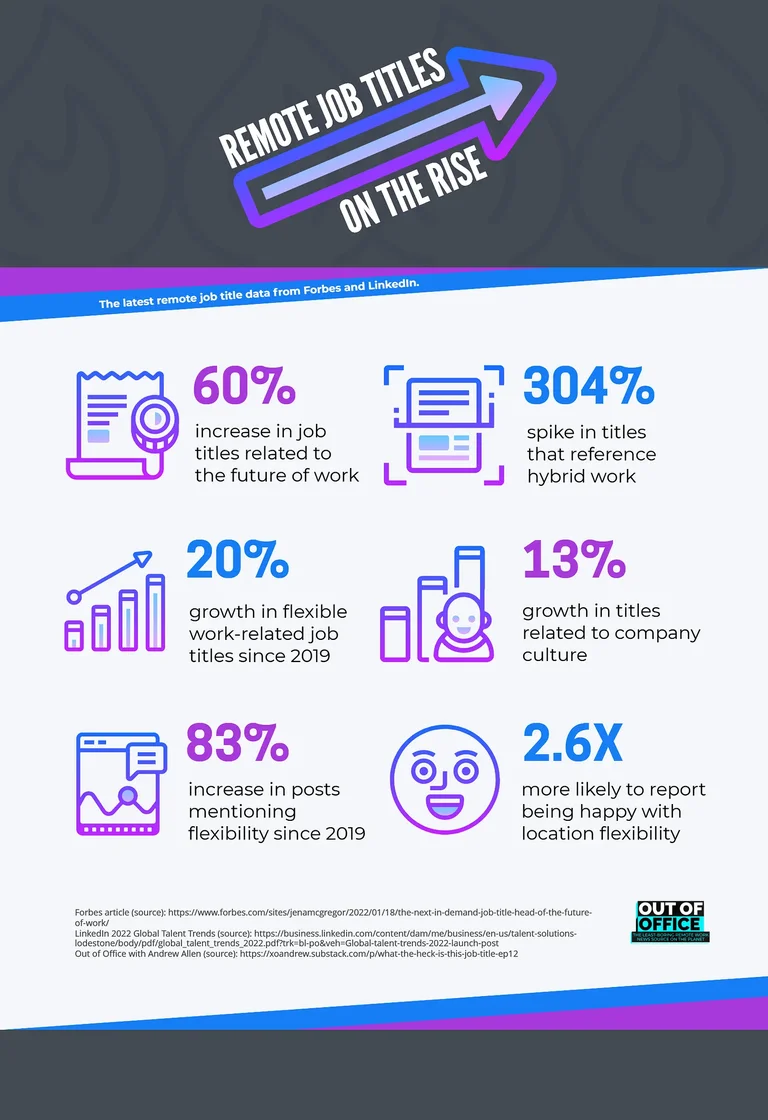Contents
- Hey! Welcome Back -
- Forbes: The Future of Work 50
- Darren Murph: The Two Remote Playbooks
- #1: What Does a Head of Remote Actually Do?
- #2: How Many Companies Have a Head of Remote?
- #3: How Many Companies Need a Head of Remote?
- This Week’s Shareable
A deep dive into why there are so few of these vital individuals around.
👑 Forbes: 50 leaders you need to watch
👨💼 Darren Murph: The man who created the remote department
💻 Head of Remote: What it does, who has one, who needs one
Hey! Welcome Back -
It’s episode 12 of Out of Office, and this week I’m jumping head first into a sizzling new job title that has just made it onto the Forbes list.
I reveal the remarkable man behind the title, try to find out what the future of this role looks like, and what it means for companies everywhere.
Ready to rumble through the remote jungle?
Here’s the scoop -
Forbes: The Future of Work 50
The Forbes future of work 50 just hit the internet, and in case you’ve been hibernating for the winter - this is one of the most prestigious lists of leaders, dream teams and executive innovators shaping the world of tomorrow, today.
This is a critical list - and one name leapt out at me as I read it.
“Darren Murph: Head of Remote, Gitlab”
🛑 His title stopped me in a dead scroll.

I’ve followed Darren’s work for some time, because it’s everywhere.
The man is prolific - he even holds the world record for the most blog posts written by one person, ever.
To be precise, Darren wrote 17,212 individually contracted posts for Engadget.com as of July 2010. His average was 12 posts an hour, or about 266 words per post.
Joshua Topolsky writes -
“Darren told us that he intends to defend the title for the rest of his natural life.”
So to see his name on a Forbes list was especially cool.
It got me thinking about what a Head of Remote actually does, how many companies have them, and why there’s only one on the Forbes list.
Surely with the major shift to remote work, there should be more?
I had to investigate.
Darren Murph: The Two Remote Playbooks
Turns out Darren was the one who coined the term, ‘Head of Remote’ and blazed a path for remote departments.
He worked for Gitlab, who once styled itself as the world’s largest all remote company.
As the ‘Head of Remote’ for Gitlab it was Darren who created the resources to help define this exciting new field. The most famous of them was his ‘Remote Playbook’ which has been downloaded over 150,000 times.
There’s also a second playbook, which speaks about his job - so he created a ton of traction for himself. After both playbooks and all the articles I could get my hands on - here’s a nice summary.
“A Head of Remote ensures operational agility and durability as a workforce decouples business results from physical geography.”
A good start but let’s dive deeper.
#1: What Does a Head of Remote Actually Do?
There is a common c-suite trick where they take something important, and make it someone’s entire job.
The person becomes the internal consultant who navigates cross-functional waters, and avoids expensive miscommunications and mistakes.
Examples include:
- Chief diversity officer
- Chief sustainability officer
- Chief happiness officer
These are all real job titles, even the Chief happiness officer - there are over 100 of them listed on LinkedIn.
A Chief remote officer might have these responsibilities:
- Setting expectations on working hours
- Finding and implementing asynchronous tools
- Bridging the gap between cross-functional teams & managers
They would also create handbooks, playbooks and resources for people working from home. These would help get the workforce up and running and help answer questions that can’t be answered by a person across the world, sleeping in bed.
#2: How Many Companies Have a Head of Remote?
Based on recent data that LinkedIn provided to Forbes - there’s been a sizable growth spurt happening in this niche.
- A 60% increase in job titles relating to the future of work
- A 304% spike in titles referring to hybrid work (since the pandemic)
- An 83% increase in posts mentioning flexibility since 2019

Jena McGregor writes -
“The only shot that hybrid has of working is if people invest in dedicated leadership to do it.” —Darren Murph, head of remote, GitLab
Look at these titles:
- Hybrid workplace flexibility lead
- Director of hybrid working
- Flexible workspace operations manager
- Vice President of employee engagement and flexible work
Companies clearly see the need for dedicated leadership.
#3: How Many Companies Need a Head of Remote?
Darren put together a kind of thesis statement with a ton of insights and in-depth research that answers this question better than I ever could.
It shows that any big company can improve their business results when they make it someone’s job to empower great collaboration between teams and employees who aren’t in-office together.
Awkwardly, corporations think that once they’ve hired a Head of Remote, the job is done. You can just pack your bags and head off to Ibiza!
That’s basically the same thing as joining a gym and expecting same-day abs.
The person hired isn’t given any power or agency to impact change. The company doesn’t really want things to change.
So when the Head of Remote says ‘reduce meetings,’ and ‘prioritize asynchronous work’ and ‘drop policies that don’t work, like the 3 day hybrid week’ - no-one listens.
A couple Heads of Remote who shall remain nameless have told me that they spend the majority of their time trying to convince executives to listen to the data.
They’re forced to roll out and defend lame duck hybrid policies and stupid rules, that everyone knows will never work.
🙈 It’s tragic - but perhaps it’s why there’s only one Head of Remote on the Forbes list.
There he is, sitting alone at the table lamenting a role reserved for lip service instead of dynamic change, as the WFH gods intended. Companies are refusing to give their remote heads power, instead forcing them into ceremonial positions.
It’s a repeat of the 80’s and 90’s. Loads of companies turned a blind eye to the need for a website, then for an online purchase path, then for customer service on social media.
We all know how that ended.
The future always rolls in like an avalanche, despite resistance. Smart companies are the ones who figure out how to go with the flow.
My message to you this week is this:
Your company needs a Head of Remote. If you’re thinking about becoming one - go for it!
But don’t be a wallflower. Demand change, get empowered and show them what is possible.
And if you have a Head of Remote, listen to them. Give them actual power or it will cost your business more than you think.
That’s it for this week - and remember the future of work is Out of Office.
Andrew
This Week’s Shareable
- This man helped define what a ‘Head of Remote’ is, does and means for your company. He also holds the Guinness World Record for most blog posts ever written. Find out more about @DarrenMurph on Out of Office this week.








